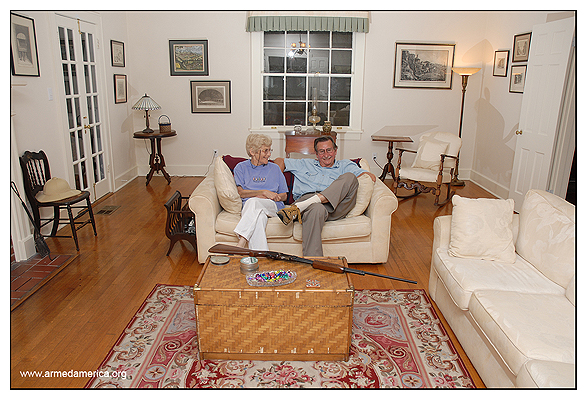
Jean and Fleming and his Winchester .410 model 42
Fleming: I was born and raised 12 miles down the road from where Bonnie Parker and Clyde Barrow were ambushed and killed -- this was in 1935. As a result of that incident, Northern Louisiana gained a reputation for being a very violent part of the world. And indeed, everybody -- that I knew anyway -- had at least two guns; a shotgun, and a .22 rifle. But these weapons were looked upon mostly as implements for harvesting food, mutch like you do with hoes, rakes, shovels, and things like that. Because they were used to take wild game. And in a country at that time where there was no electricity, no trains to speak of, you couldn't buy anything. If you didn't grow it or kill it yourself, you didn't eat. So everybody that I new of, went out to hunt for food and shells were expensive -- it was on the edge of the depression, shortly before World War II and people learned to practice gun economy, i guess you would say. People took care of guns, guns were cherished ... and you didn't mess with somebody's gun. They were used as something to acquire food. That was all they were used for. This business about people shooting each other -- that has come about, I think, as a result of money being introduced into our culture. Some people didn't have any, and some people wanted some, so they went out an "liberated" it.
For me, it's a sport. I don't go very often, but when I do, I enjoy walking in the woods. I never take more animals than we can eat. I think, in a way, a gun, if it's used properly, can be a tool to teach good citizenship. Because it teaches people to be frugal, to not be wasteful, and above all, it teaches people not to waste our heritage; take what you need, but don't take any more. I like to see kids, out in the woods, doing what they do, in a way that is responsible. The more contentious among us all take their children out to the woods at a very early age and let them practice woodsmanship.
Jean: I hate guns. Don't get me started.